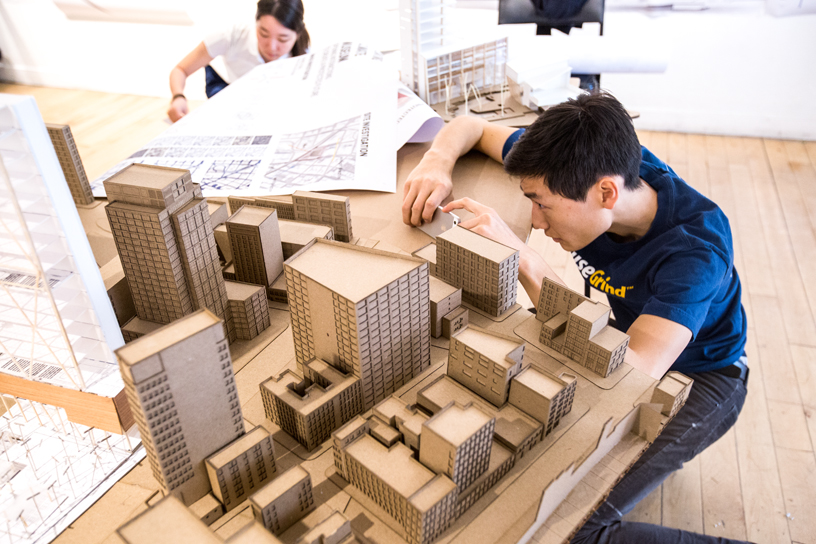
Architecture Masters Theses
RISD’s Master of Architecture program is one of the few in the US embedded in a college of art and design. Here, architecture is taught in a way that understands the practice of design and making as a thoughtful, reflective process that both engenders and draws from social, political, material, technological and cultural agendas. The program aims to empower students to exercise their creativity by understanding their role as cultural creators and equipping them to succeed in the client-based practice of architecture.
The degree project represents the culmination of each student’s interests relative to the curriculum. A seminar in the fall of the final year helps focus these interests into a plan of action. Working in small groups of five or six under the guidance of a single professor, students pursue individual projects throughout Wintersession and spring semester. Degree projects are expected to embody the architectural values that best characterize their authors as architects and are critiqued based on the success of translating these values into tangible objects.
Graduate Program Director: Hansy Better Barraza
These works are licensed under a Creative Commons Attribution-NonCommercial-No Derivative Works 4.0 License.
Theses from 2019
No long urban, can't be rural, definitely not suburban : the experience of Detroit, Karin Jane Hostettler
Tanzania : a new architectural pedagogy, Cameron Leandri
In the wake of the atoms+sphaira, Jesús Meléndez Vázquez
The urban shelf : a hybrid between architecture and infrastructure, William Morales
Trash as culture : culture as trash, Sara Naja
Kippee-ki-yay : an energy case study, Madison Blaize Russ
Can you shut the door? : exploring the personal as political in the domestic bathroom, Hannah Winders
Theses from 2018
The space in between : liminal space, Wei-Chun Cheng
Opine : positioning architecture, Kevin Crouse
Chaos and order, Jie Du
Archinaut : Archinaut design laboratory office manual, Joseph Echavarria
Woven curvature, Yuhao Jiang
Throwing architecture to the sea : discipline out of context, Andrea Kelly
Transporting eating architecture, Margaret Kiladjian
The long forgotten city element, Yun Chu King
Facade of democracy : realizing the architecture of the fourth wall, Johnny Yueh Han Lin
Möbius system : a pseudo-world made from pseudo-science, Xinye Lin
Designing for disaster resilience in Puerto Rico, Aislin Mac Donald
The room : the space between, Adelaide Cushing Mackintosh
In between, Farinaz Moslemi
The present, Ann Motonaga
Columns of some kind : kinetic, structural, formal, periodic & interactive elements of architecture, Jhanani Palanismay
Redundancy for change, Kyuyeon Park
A monument thesis, Graham Rice
Joy through layered tension : convergent fire-escapes fulfill a new community, Luca Rivelli
A third thing : an exploration of black hair in architectural design, Christina B. Schaller
Decoding the digital border, Gian Villarruel
Shadow theater, Yaodan Wu
Open community : break up the "superblock", Ke Xie
Nostalgia for the future : home 2028, Junqing Yang
Ambiguous surfaces : dressing the wall, dressing the room, dressing the building, Danni Zhang
Theses from 2017
Proximity, interaction, and evolution : taking a deeper look at the systems around us, Rachel Back
Unfolding : architecture as dwelling in a folded space-time continuum, Feiyi Bie
openness, Yu Cao
Writing a city : a self-reflexive exploration between the lines, Po-Ming Chou
The flood : another note of humanity, Muyi Fan
The void between us, Xiaofan Fan
Sculpting time in spatial narrative, Hua Gao
Resilience on Wall Street, Rahul Ghera
In between forces, Jungyun Lee
Motion and architecture : transition between spatial fluidity and body language, Tong Li
Simultaneity of space, Amy Lungariello
Sharing : a synergy of natural forces, existing urban conditions and human characteristics, Zhen Meng
Room in a forest, Amelia Millan Osma
Perceptible ambiguity : learning center, Zhurong Qian
Killing the angel, in the mind, body and home, Vaishnavi Ramesh
Cultural infrastructure, public space, and the contemporary library in Toronto, Zoë Ritts
Collective consumption : a game for living, Zachary Rochman
Living on the edge : failure by design, Odile Schlossberg
Envisioning ecological cities, Carlton Smith
[DE]construction and [RE]construction : a promenade theater, Jingjing Zhao
A tale of lights : light as the visual construct of the ephemeral space, Alice M. Zhen
Theses from 2016
Origami condition design, Yin Lu
Curating architectural spaces : a way of architecture production, Cheng Yang
Theses from 2015
The complexity of plainness, Michael Clouse
Faith in phases, Linyi Dai
F(r)iction, Rami Hammour
In light of light, Chen Sun

